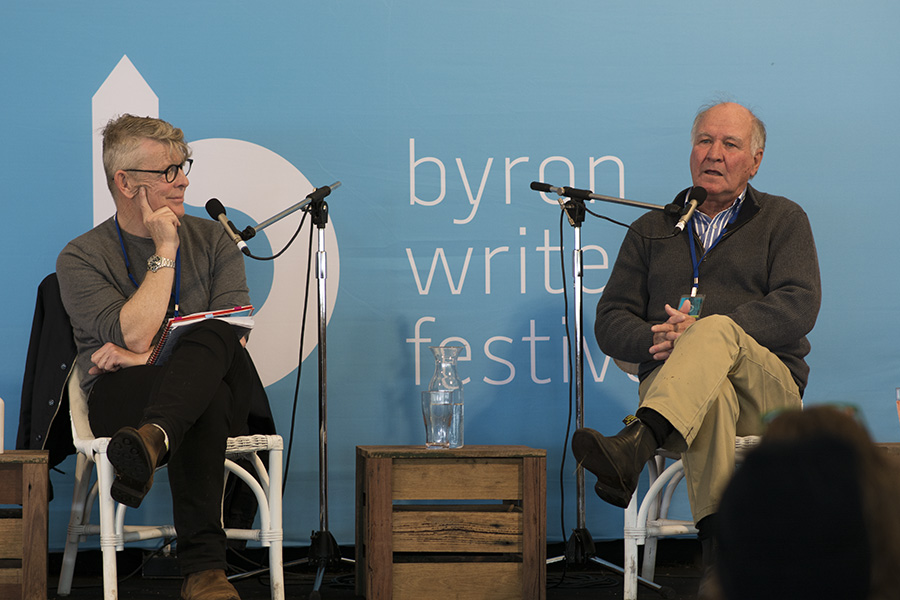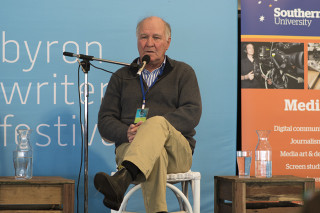Tony Windsor: in conversation

When it comes to Australian politician Tony Windsor, ‘it is generally acknowledged by all who have worked with him that he’s a good bloke,’ said chair and Byron Writers Festival founder, Chris Hanley. His conversation with Windsor showed that indeed this is true.
Windsor received a steep rise in publicity when he supported the Gillard minority government as an independent member of parliament in 2010. This was the right decision, according to Windsor, as he believed that, despite the Labor party’s self-destruction, a lot of good hard work was done regarding policy.
Hanley expressed his bewilderment about the generally negative popular view on the hung parliament, despite 600 pieces of legislation being passed. Surely, this was an important and positive era of governance.
‘History will judge that it was,’ said Windsor, citing such major pieces of legislation as the National Disability Insurance Scheme (NDIS) and the Gonski education reforms.
Windsor shared fond memories about the antics between he and his fellow politicians during his time in Canberra. He reminisced about sharing an office with Green MP Adam Bandt, with whom he would pretend to have brawls with by banging on the walls of his office, or calling out ‘bloody Greens!’
As for former prime minister Julia Gillard herself, Windsor declared that while he had regard for Gillard before working with her in the hung parliament, but had a real respect for her at its end.

Perhaps more tumultuous than the Gillard minority government was trying to work with Tony Abbott as opposition leader.
Windsor recalled discussing the proposals of the opposition with Abbott, but realised soon enough that he (Abbott) was not interested in making legislation.
Windsor branded Abbott as a ‘brilliant oppositionist’, and when asked if he was surprised by the way Abbott handled negotiations responded, simply, ‘no’.
In the current political climate, where the public seems disillusioned by the inaction and rhetoric of parliamentarians, Windsor as a politician himself, empathised.
‘The two major parties are not philosophical parties any more, they are management teams interested in power,’ Windsor quipped, ‘we have winner-takes-all politics – and they are both Liberal parties, in my opinion.’
Nevertheless, he remains optimistic.
‘Not because of what Australia is doing. I think we’ve been pathetic… we will come on the coat tails of the big economies.’
In Windsor’s opinion, Australia had the opportunity to be a world leader in climate change action, and this was ultimately wasted.
Windsor gave some advice to current Prime Minister Malcolm Turnbull in the hope of moving Australia into a more prosperous and less politically hostile country: learn to compromise.
Initially, before the 2016 election, Windsor believed that Turnbull would be the one to move parliament towards something more bipartisan and constructive, particularly since this was a primary platform that he operated on while electioneering.
However now the election is over, bipartisanship has yet to make an appearance. And, Windsor noted, Turnbull has rejected opposition leader Bill Shorten’s proposals on issues such as negative gearing.
Windsor, who was the NSW state member from 1991-2001 and then the independent member for New England from 2001 to 2013. He made a tilt at New England again in 2016, in an attempt oust to Nationals leader and deputy prime minister Barnaby Joyce.
Australia’s political climate has been internationally mocked for the past 7 years, and possibly with good reason. The disconnect between politicians and what they represent, the people, is growing.
Windsor said that politicians know exactly how to fix the problems with Australia’s economy, which has been a prominent issue in the past three elections, but their concern with power seems greater than concern for policy.
The standing ovation Windsor received at the conclusion of the session was a testament to the fact that, while some politicians may have lost sight of what they represent, others have not and continue to be ‘good blokes’.
Lachlan Rutherford is a Bachelor of Arts (Honours) student at Southern Cross University. He completed his Honours thesis on David Foster Wallace’s fiction this year.
